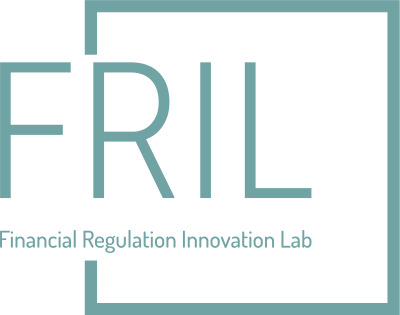Finance and Health Lab National Conference to convene cross-sector leaders at The Edinburgh Futures Institute
FinTech Scotland today announced the Finance and Health Lab National Conference, on 19 March 2026, an invite-only national event bringing together leaders from financial services, health, academia, government and the innovation ecosystem to explore how Scotland can lead the next wave of progress at the intersection of health and financial wellbeing.
Hosted at the University of Edinburgh’s Futures Institute, the conference will showcase practical insights, emerging innovation, and opportunities for collaboration focused on challenges that matter in later life and beyond — including inclusive service design, strengthening financial resilience, and building trusted approaches to data.
The Finance and Health Lab is designed to accelerate collaboration across sectors, connecting partners to test ideas, generate evidence, and support innovations to move from insight to impact. The conference will share what’s been learned so far and set out the next steps for continued ecosystem action.
What to expect on the day
The one-day programme (10:00–16:00, arrival from 09:30) includes:
- A keynote and guided discussion on the future of financial health in an ageing society
- A research insight showcase on health–wealth dynamics in later life
- An industry panel on designing future-ready, inclusive financial services
- A startup showcase and demonstrator session featuring ventures from the innovation call
- A data proposition session exploring trusted, ethical pathways for financial-health data use
- A closing conversation on scaling innovation through collaboration and national impact
Registration is invite-only, with a register interest option available via the event page.
Aleks Tomczyk, Chief Executive, FinTech Scotland, said: “Scotland has a unique opportunity to lead in innovation that connects financial resilience with healthier outcomes. The Finance and Health Lab National Conference brings partners together to share evidence, spotlight innovation, and build practical routes to collaboration and scale.”
Dr Andrea Taylor, Chief Executive Officer of Edinburgh Innovations, said: “This is an opportunity to align research, practice and policy and focus collective effort on innovations that can make a measurable difference for people as they age.”
Register interest
This event is by invitation only. Register your interest on the Finance and Health Lab National Conference page to receive further details.
In conversation with Financial Services: Why innovation really matters
The term ‘innovation’ might bring to mind a race for better technology, systems and smarter data, but beneath it all lies a fundamental question: how do we create a fairer financial future for all?
For most people, financial advice isn’t about products, platforms, or policy. It’s about life: buying a first home, protecting a family, surviving a setback, or planning for a future that feels uncertain.
Yet for millions, financial advice remains out of reach.
As one of the most significant regulatory shifts in recent years begins to reshape how people access financial support, the financial services sector is radically reshaping how advice and guidance is delivered.
This is just the kind of challenge that our pioneering Innovation Calls take on, led by our team in the Financial Regulation Innovation Lab (FRIL). Our latest call focused on the Financial Conduct Authority’s (FCA) Advice Guidance Boundary Review, a technical name for a very human issue: how to make financial help clearer, fairer and available to far more people.
Bringing together fintech founders, academics, financial services leaders, and regulators, FRIL’s Innovation Call creates a space where policy, practice, and possibility meet.
Here, we speak with two financial services leaders involved in the call to find out more about why innovation is so important to their firms, as well as the future of the sector:
- Maria Herrero Bullich – Chief Customer and Digital Officer, Insurance, Pensions & Investments at Lloyds Banking Group.
- Kate Murray – Strategic Projects Lead, Scottish Widows & Lloyds Banking Group.

Addressing the Big Picture
“For me, the utopia is that everyone who wants to do the right thing for their future has real choice. Whether they’re looking for simple guidance, clearer recommendations, or full financial advice. What matters is that people have different options, depending on their needs, and the freedom to decide which path is right for them,” explains Maria.
“It’s important to us to close the advice gap by building tools that help people think about their futures, especially those who can’t afford traditional advice, so they still have access to clear, targeted support when making important financial decisions.”
And this work matters, because the numbers are concerning. Millions of people across the UK still receive no financial advice at all, and while support exists, it is often out of reach for those who need it most.
The Advice Guidance Boundary Review represents a critical moment for the sector, an opportunity to ensure that more people can finally access support when making some of the most important decisions about their money.
Kate explains: “Our purpose is to help more people secure their financial futures, in a way that aligns with our wider goal of helping Britain prosper. There’s a real advice gap in the industry, and whether someone is our customer or not, we want to help fill that void so more people can move towards a more prosperous financial future.“
“At one end of the spectrum, people can’t afford advice –so they self-serve through available guidance, but don’t know what to do with it. At the other end, people can access full, holistic advice. In the middle, many don’t know how to save, invest or prepare for retirement. That’s where we see innovation and new solutions helping people understand their next step, whether that’s saving and investing more, planning for retirement, or putting more into their pension.”
Meeting Consumer Needs
And when we look more closely at this issue, it becomes clear that a one-size-fits-all approach simply won’t meet the diverse needs of consumers. Across the industry, firms are increasingly focused on developing more tailored ways to support those who are currently slipping through the advice and guidance net.
Maria explains: “There are parts of society that face very different challenges, from the gender gap in pensions to younger generations trying to save for the future. We’re focused on how to bring people who often have less financial confidence into the conversation and help them think about their futures.“
“Different groups need to be engaged in different ways. Younger people can be hard to reach, so we use techniques like gamification to encourage them to start those conversations. Others, such as people who feel less confident about investing, or women who may have taken career breaks and are worried about having enough for a comfortable retirement, face different barriers.”
These are very real issues, affecting everyday lives. Kate stresses the impact of what happens if the gap isn’t closed:
“Through work like our annual Women in Retirement report, we can see a massive gap in people’s financial futures. Significant proportions of society, who are working today, are on track to reach retirement without enough money, and that means going from work to a retirement in poverty.“
“That’s a serious problem, not just for individuals, but for the UK as a whole. It’s a systemic, government-level issue that needs to be addressed now, to prevent that happening for people as much as possible.”

Future Solutions Now
Finding solutions to these challenges requires a collaborative approach – different perspectives, experience and skillsets. That’s why this FRIL Innovation Call matters so much.
“It’s been so interesting to meet the fintechs and to connect with strategic partners, to better understand what they can bring to help us move at pace and innovate – so we can, at scale, support more customers to secure their financial futures,” says Kate.
“It’s been so interesting to meet the fintechs and to connect with strategic partners, to better understand what they can bring to help us move at pace and innovate – so we can, at scale, support more customers to secure their financial futures,” says Kate
“This is a huge opportunity for us. Scottish Widows has been involved in earlier calls, and this feels like a real chance to do things differently. At Lloyds Banking Group, we’re constantly trying to change how we innovate and move faster. Bringing in outside thinking, new technology, and completely different perspectives helps us bridge that and go quicker.”
And that’s why innovation in financial services is about far more than technology, systems, and data. As Maria puts it:
“We focus on creating experiences that aren’t built around products, but around people. It’s about understanding what they need, where the gaps are, and how to help them close them.”
The Advice Guidance Boundary Review. Just what does it all mean?
Advice: A regulated service where a financial adviser looks at your full financial situation and gives you a personalised recommendation.
Guidance: Support that points you in the right direction based on limited information you share, without telling you exactly what to do.
Boundary: The line that separates advice from guidance, defining how much information is needed and what a firm can or can’t recommend.
Review: The regulator’s process of consulting industry and consumers, and government to create clear new rules that will shape how these services work in future.
What next?
Enjoyed this piece? Hear from the perspective of the fintechs involved in the call. If you’re interested in the work of FRIL more generally and would like to contact a member of the team email: FRIL@fintechscotland.com.
Multimodal AI for Scaling Targeted Support: Navigating the FCA Advice–Guidance Boundary
Summary
The Financial Conduct Authority’s Advice Guidance Boundary Review (AGBR) seeks to address a persistent advice gap in UK financial services by enabling new forms of scalable, decision-relevant consumer support that sit between generic guidance and personalised financial advice. This challenge is particularly acute in pensions, where consumers face complex, long-term decisions but exhibit low engagement with traditional advice services. This white paper examines the potential of multimodal generative artificial intelligence to deliver targeted support in pensions while remaining within the advice–guidance boundary. Drawing on recent advances in Vision Language Models and multimodal conversational architectures, the paper develops a solution framework for speech-enabled, audio-visual digital advisors that are compliant by design. A Digital Pensions Advisor prototype is presented to demonstrate how such systems can interpret real consumer narratives, recognise and respond appropriately to vulnerability, and maintain boundary discipline when confronted with requests for personalised advice. The paper concludes by outlining a roadmap for strengthening auditability, explainability, and supervisory readiness, and by identifying future research directions, including the role of formal and informal information sources in shaping consumer understanding. Collectively, the findings suggest that multimodal AI can play a meaningful role in scaling targeted support in pensions while preserving regulatory safeguards and consumer trust.
Hao Zhang Digital Avatar demo
Finance and Health Lab launches Innovation Open Call for later life financial wellbeing solutions
FinTech Scotland today announced the launch of the Finance and Health Lab Innovation Open Call, inviting fintechs, startups, and innovators to develop and test ideas that address defined challenges affecting financial resilience, financial confidence, and quality of life as people age.
The Finance and Health Lab is a national programme led by FinTech Scotland, bringing together financial services organisations, fintech innovators, academics and public sector partners to explore how financial wellbeing and health interact and intersect in later life. The open call is designed to move beyond general discussion, creating space for evidence-led innovation, collaboration and practical experimentation that can inform future services, models and policy.
As the population grows older, changes in health, income, care needs and financial complexity increasingly shape people’s wellbeing. Through this open call, applicants are invited to propose solutions aligned to priority challenge areas focused on improving outcomes in later life.
Industry partners
Innovators selected through the open call will have the opportunity to engage with participating industry partners:

Priority challenge areas
The Innovation Stimulation programme is structured around a set of priority use cases reflecting pressing later life financial health challenges. Applicants should align their ideas to one or more of the following:
1. Predictive Financial Vulnerability Insights for Later Life
Using health, behavioural and financial data to generate early warning insights that help identify when individuals may be entering periods of financial vulnerability due to health changes.
2. Healthy Ageing Scenario Simulation for Financial Planning
Creating dynamic, personalised scenario planning tools that model the financial impact of later life health events — including longevity, income change and care transitions.
3. Data Quality and Ethical Data Sharing for Health and Wealth Insights
Strengthening permissioned, ethically governed data flows between health, financial and public sector systems to support better later life services — improving trust, transparency and data quality.
4. Cross-System Care and Financial Navigation for Ageing Populations
Helping people navigate fragmented ecosystems spanning health services, social care, pensions, insurance and benefits as needs evolve — reducing complexity and stress.
5. Empowering Later Life Financial Decision Confidence
Strengthening confidence and decision-making, reducing anxiety and supporting long-term wellbeing through complex or high-stakes decisions.
6. Age-Friendly FinTech and Inclusive Digital Service Design
Making digital financial services more accessible, trustworthy and supportive for older adults and those with health-related barriers.
Aleks Tomczyk, Chief Executive, FinTech Scotland, said:
“The Finance and Health Lab open call is about practical progress — bringing innovators and partners together to explore solutions that can strengthen financial resilience and support better outcomes as people age. We’re looking for bold ideas grounded in real needs, with the potential to be tested and learned from quickly.”

How to Apply
Applications open 4 February and close 12 February.
Learn more and apply on the Finance & Health Lab Open Call page.
Creating fairer financial futures: A focus on the fintechs
Innovation starts with people. That’s our belief at the Financial Regulation Innovation Lab (FRIL), and that’s why we bring together pioneering fintech entrepreneurs with industry and academia to address challenges facing financial services – both now and for the future.
At FRIL’s latest Innovation Call, fintech entrepreneurs took on one of the most significant regulatory shifts in the sector, pitching ideas that could change how millions of people access financial support and move us closer to fairer financial futures.
But what really drives these fintech founders, and what happens behind the scenes for them at an Innovation Call?
We spoke to two of the founders who took to the stage to find out more.
First of all, let’s meet Crawford Taylor, a co-founder of Afternoon, a data and AI operating model for financial advisors

Crawford, you’ve just come off the stage, but before we hear about that, please tell us, what exactly is a ‘data and AI operating model for financial advisors’?
“Sure, it means that we collect the data financial advisers need to support their clients, enrich it, and then use AI to automate their workflows. That significantly reduces the time it takes for advisers to deliver advice, so they can focus more on their clients.”
And why does this area matter to you?
“Before this, I worked as a consultant advising trustees and companies on defined benefit pension schemes, helping secure the future for people who already had a pension so they’d receive what they were due at retirement. This feels like a natural extension of that, helping more people manage their money better and be financially better off.”
You’ve just pitched at our Innovation Call, how did that go?
“I think it went well. With 19 other companies pitching to a panel of around 10 large corporates, including organisations like M&G, NatWest, and Sopra Steria, it’s a great opportunity to explore potential partnerships.”
As a fintech founder, what is your big ambition?
“There’s around £18 billion spent on financial services technology every year, and it’s only going to grow, yet there’s still a huge advice gap, where many people can’t access or afford support. So much time is lost joining the dots, from opening accounts to moving money. Our ambition is to automate that entire process, so advisers have everything at their fingertips and clients can go from advice to action – opening accounts and transferring funds – in seconds.”
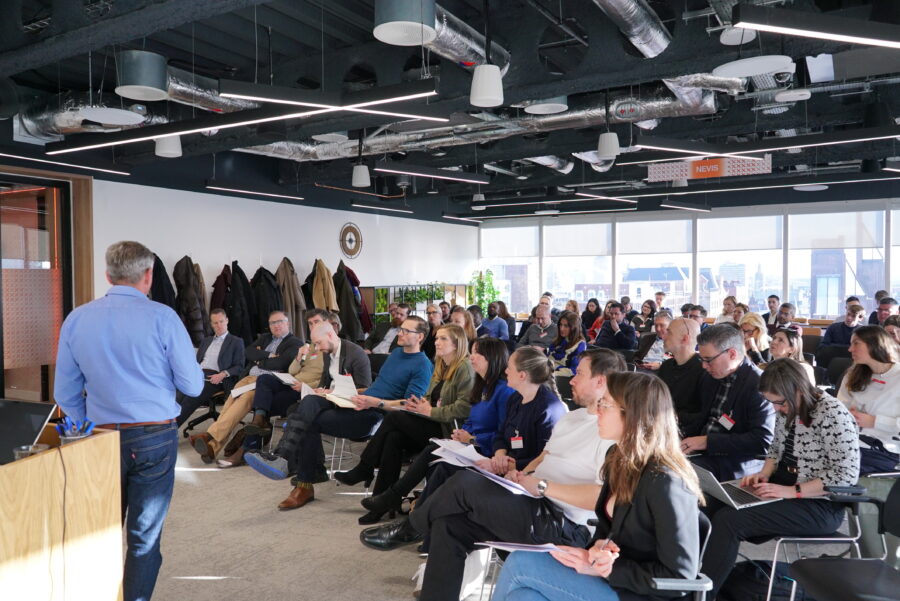
Thanks Crawford, and final question, what has being involved in the Innovation Call meant for you?
“It’s been energising. The Innovation Call was exceptionally well designed; it respected how stretched early-stage teams are, while still pushing to sharpen our thinking and ambition. The combination of regulator insight, industry partners, expertise from Growth Builders and practical support created real momentum for us. Huge thanks to Fintech Scotland and everyone involved.”
And now let’s hear from another fintech founder, please meet… Dia Banerji, founder of Cherpa.ai, an AI money coach that delivers hyper-personalised financial education.
Dia, you’ve just done your pitch – how did it go?
“I was first up, which always adds a bit of pressure, but it felt good. The presentation went well. Most importantly, I was able to clearly tell the story of why Cherpa.ai exists.“
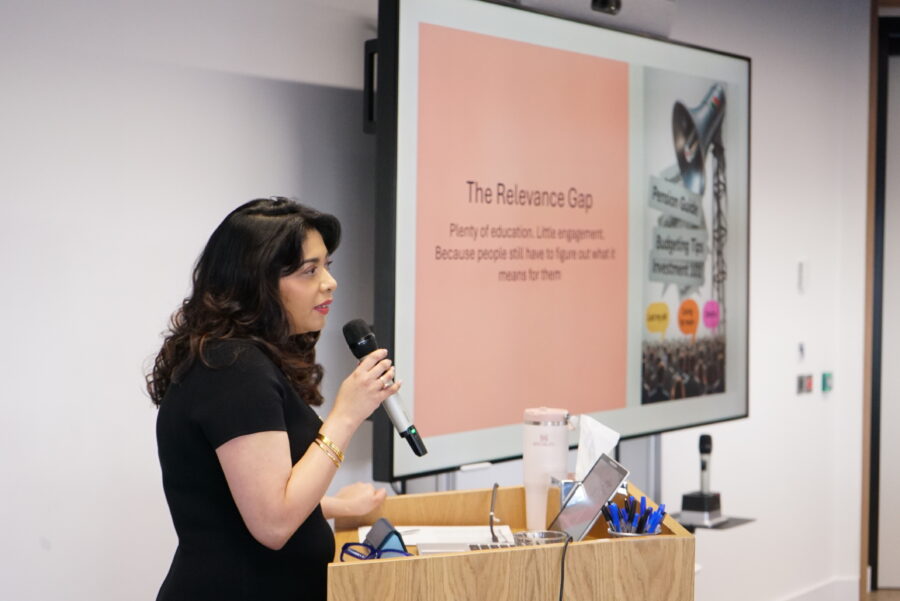
And on that note, Dia, why does Cherpa.ai exist?
“It is very close to my heart. So many people feel a real sense of shame when they don’t understand money, and that keeps them from asking questions. I recently ran a survey about money confidence, one person told us their biggest wish was simply to feel less ashamed about talking about money – and that really stayed with me. Cherpa is here to change that and help people connect with their money and navigate life with confidence. Because every life moment is a money moment.”
Why does this call matter to you?
“This call matters a lot to Cherpa & me personally. More than 90% of people in the UK can’t access financial advice, and there’s a big step before advice that’s really about awareness and education. People often see ‘investment’ as something for someone else, and financial education is still very low, which leaves people disconnected from their money. That’s why this call feels important, not just for the UK but for the world.”
And are there any particular aspects that have struck you over the last few weeks?
“I’ve been really happy to be part of this cohort. The run-up has been amazing, with sponsors coming in, sharing their problem statements, and giving us time to learn from them and from the other fintechs. It’s been great to feel part of a real community and to play a small part in helping Scotland thrive.”
What are your hopes for the result?
“I’m really excited to be part of this cohort and would love to work more closely with some of the sponsors. Beyond that, it’s about being part of a wider fintech community, learning from others, and helping Scotland, and ultimately people everywhere, build more confidence and connection with their money.”
So what next for the fintechs who took part?
With the winners now announced, the successful teams will receive grants of up to £50,000 to develop, scale and implement their ideas over the coming months.
But the journey doesn’t end there. Beyond the winners, many of these ideas are likely to spark further interest, partnerships and pilots in the months ahead.
If you’d like to find out more about the work of FRIL, please contact us at FRIL@fintechscotland.com.
Financial Regulation Innovation Lab awards £50,000 each to four fintechs to accelerate consumer wealth support
The Financial Regulation Innovation Lab (FRIL) today announced the four fintechs selected to receive grants through its latest Future of Wealth Innovation Call, delivered by FinTech Scotland in partnership with SuperTech WM.
The six‑week programme concluded on 15 January with a Showcase Day, where 21 fintechs presented solutions to the challenge: helping consumers make informed financial decisions and access more tailored wealth support, while keeping pace with evolving regulation.
Throughout the programme, and against the backdrop of the joint HM Treasury-Financial Conduct Authority (FCA) Advice Guidance Boundary Review (AGBR) which seeks to help close the UK’s advice gap by clarifying how firms can provide more meaningful support under the Consumer Duty, participants took part in workshops and deep dive sessions to develop, refine and tailor their propositions to real world industry needs and potential pilots with partners. The FCA was involved throughout and provided both valuable clarity and guidance.
The Innovation Call was delivered with the support of 10 strategic partners: PwC, Barclays, Lloyds Banking Group, Sopra Steria Financial Services, NatWest Group, M&G, BNP Paribas Personal Finance. , Dudley Building Society, Wesleyan and Standard Life; alongside academic partners at the University of Strathclyde and the University of Glasgow, and Growth Builders, which supported delivery.
Following the Showcase Day, four fintechs were selected to receive £50,000 each to further develop their solutions. Over the grant period, the awardees will continue to collaborate with industry and academic partners to test, validate and accelerate their innovations towards adoption and scale.
The winners are:

Finspector is an AI-powered compliance platform that automates the review and monitoring of financial promotions across text, images, video, and social media. It helps regulated firms reduce risk, evidence compliance, and scale marketing activity with confidence across jurisdictions.

Planda is a behavioural AI platform that helps financial services firms move beyond outdated segmentation to deliver hyper-personalised customer engagement. By connecting data across enterprise workflows, Planda builds dynamic customer segments that evolve in real-time, enabling institutions to personalise at scale and deepen relationships.

Amplified Global uses AI and Machine Learning to help firms assess, simplify, and demonstrate consumer understanding at scale, ensuring they meet compliance obligations with confidence. Its technology analyses and enhances intelligibility, helping organisations turn complexity into clarity. Through a guided digital journey, it makes content more engaging, measurable, and human – redefining how people connect with information.

Afternoon’s the new data + AI first operating model for advice firms. Data collection is automated with a focus on completeness and quality. AI modules automate work, allowing a doubling of clients with the same team and with less risk from meeting to report in under 2 minutes.
Aleks Tomczyk, Chief Executive, FinTech Scotland, commented:
“The Advice Guidance Boundary Review is pivotal to widening access to meaningful financial support across the UK. Too few people are saving adequately for retirement, and historically advice has skewed towards higher earners. Government, regulators and industry are aligned on helping the wider population make better‑informed financial decisions. By funding these four winning projects and opening real‑world pilots with partners, we’re accelerating practical solutions that improve consumer decision‑making and access to support, while helping firms operate confidently within the advice–guidance boundary.”
Kate Murray, Strategic Projects Lead, Scottish Widows & Lloyds Banking Group, said:
“We want to fill the advice gap that currently exists in Britain and ultimately, enable people to have a much more prosperous financial future. The Innovation Calls present such a massive opportunity. We at Lloyds Banking Group are changing the way we do change and innovate to go faster. Bringing in outside thinking, technology, and just a completely different perspective can help us achieve that.”
Hilary Smyth Allen, Chief Executive, SuperTech WM, added:
“Partnership matters because that’s how you really get things done with impact. Through the partnership with FRIL, we’ve been able to work across a broader spectrum of the ecosystem. Consumers come in all shapes and sizes, and so does the industry that services them. Innovation for us means we are maximising outcomes for those consumers.”
Crawford Taylor, CEO & co-founder, Afternoon Finance, stated:
“The advice gap is real, and firms are under growing pressure to support more people, with better outcomes, under tighter regulation. Afternoon exists to make that possible, using data and AI to remove friction, reduce risk and radically improve how advice is delivered.
This funding allows us to continue to accelerate our mission: helping advice firms support more clients, more effectively, without compromising quality, compliance or trust. Being selected as one of just four winners from over twenty fintechs is a huge validation of the approach we’re taking.”
Creating fairer financial futures: A spotlight on FRIL research
Technology-enabled advice, Regulation and the Advice Gap: 10 minute Insight from FRIL Research. 10 Questions with Chuks Otioma, Research Associate, Adam Smith Business School
As financial services explore new ways to close the advice gap, technology enabled advice and guidance models are increasingly part of the conversation – but what do they really mean for consumers, firms and regulation?
As part of the Financial Regulation Innovation Lab (FRIL), researchers from the University of Glasgow and University of Strathclyde are working alongside industry, fintechs and regulators to examine how innovation can be deployed responsibly in financial services.
In this conversation, Chuks Otioma, Research Associate, reflects on his research into these digitally- enabled advice models: what they are, why they matter, and how they sit within the Advice Guidance Boundary Review.
1. Chuks, let’s start with you first of all – what drew you to this field of research?
Before moving into academia, I worked in industry, in telecommunications. During my PhD, I looked at the links between digital capabilities, innovation and economic performance, and the role of entrepreneurs and innovators in leveraging digital advances; work that now informs my research into AI in financial services. I was particularly interested in how firms reorganise themselves, their processes, structures and activities in order to draw value from digital technologies.
At that stage, my work wasn’t focused on financial services specifically. It was broader, looking at firms across sectors and how they approach digital transformation. What I’m doing now is a natural progression of that work, but with a much sharper focus on financial services and the challenges firms face in deploying technologies like AI.
2. OK, let’s explore your research Chuks. First of all can you explain to us what “technology-enabled advice and guidance models” actually are?
At a basic level, the term refers to digitally enabled advice. It can be relatively simple, or more advanced, using AI to construct and refine portfolios.
What’s important is the way technology can help streamline advice around individual needs. But this also raises important considerations. You have to think carefully about the data being used, the potential for data breaches, and whether consumers genuinely understand the advice they’re receiving.
There are also different operating models. Some are largely consumer-led, with minimal human interaction. Others are more professional-led, where investment or wealth managers use automated tools to manage portfolios on behalf of clients. Each model raises different questions around responsibility and duty of care.
3. The Advice Guidance Boundary Review aims to ensure that financial help is clearer, fairer and available to far more people. How do these technology-enabled models play a part here?
Some forms of digital advice function as guidance, pointing consumers towards information or helping them explore options. Others go further, making recommendations or even decisions on a client’s behalf, which brings them firmly into the realm of regulated advice.
That distinction matters, particularly as systems become more advanced. The more decision-making is delegated to automated systems, the more important strong compliance, governance and accountability become.
4. Can these models really help address the financial advice gap?
There is evidence that automated advice has already improved access and inclusion, particularly among younger people and those who might not otherwise engage with traditional investment services.
Because these systems can draw on rich data and integrate information from multiple sources, they have real potential to support people who currently lack access to advice.
What’s especially interesting is the way some platforms are beginning to connect users to independent financial advisers, recognising that investment decisions don’t exist in isolation. Financial wellbeing also involves literacy, planning and understanding long-term goals.
“These systems have real potential to support people who currently lack access to financial advice.”
5. What risks need to be managed as technology-enabled advice and guidance becomes more common?
In our research, we look at several dimensions. There’s the operating model, and how responsibility is shared between consumers, professionals and platforms. There’s financial risk, including market volatility, trend-chasing and over-concentration.
We also examine data practices, including how platforms are designed, who has access to data, and how data is shared across third parties and jurisdictions. In many cases, the developer of the system is not the same as the organisation managing it, which raises important governance questions.
“When advice becomes more automated, firms need to be clear about who is responsible when things go wrong.”
6. What has surprised you most in your research?
One of the most striking findings is the level of consumer misunderstanding. Products are often designed on the assumption that firms understand their users, but in practice there can be significant misalignment between innovation and user understanding.
This isn’t necessarily about consumers lacking capability. It’s often about how products are designed, communicated and framed. That’s a critical lesson for firms designing these products.
7. What big questions does this raise for firms and for the industry?
One of the big questions is around responsibility and accountability, particularly as more decision-making is delegated to automated systems. When advice becomes more automated, firms need to be clear about who is responsible when things go wrong.
Beyond that, these developments also raise important questions about how firms organise themselves. Automated advice reshapes how services are delivered, which has implications for workforce skills and training. Technical teams increasingly need some understanding of finance, while those working in finance or customer support need a basic understanding of how AI-based systems work.
There are also strategic questions around how these systems are developed and deployed. Firms need to decide whether to build solutions in-house or rely on third-party providers, and how external systems integrate with existing or legacy technologies. These choices affect how services are scaled and managed over time.
Taken together, these are organisational challenges as much as they are technological ones, and they shape how firms deliver automated advice in practice.
8. With all this in mind, what future are you trying to help shape through this research?
For me, the most important thing is societal relevance. I’m interested in research that informs policy-making and speaks directly to real-world challenges.
FRIL is quite unique in that sense. The challenges we work on are industry-led. You have problem owners defining the issues they face, fintechs developing solutions, and researchers contributing evidence and insight that can help shape both practice and regulation. It’s impact-oriented research, and that’s very fulfilling.
Ultimately, the future I want to contribute to is one where research doesn’t sit in isolation, but actively helps address the problems faced by industry, policymakers and society more broadly.
9. Can you share some examples of wider real-world challenges you’ve been working on?
One example is our work looking at consumer complaints within financial services. By analysing the types of complaints that are escalated to the Financial Ombudsman Service, and how providers respond to them, we can better understand where things go wrong.
If we understand these friction points, there’s an opportunity to co-develop financial products differently, reducing the likelihood of harm or escalation in the first place.
In our work on automated advice, we’ve also explored how providers can embed responsible practices into their models. That includes linking clients to green or sustainable investment opportunities, and aligning portfolios not just with financial returns, but with broader social and environmental goals.
“Automated advice reshapes how services are delivered, with implications for workforce skills, training and how firms organise themselves.”
10. Finally, what feels special about doing this research here, in Scotland, and within the FRIL ecosystem?
What stands out for me is the research culture and the ecosystem we’re working within. The University of Glasgow, and the Adam Smith Business School, have a strong international research culture, and we work very closely with colleagues at the University of Strathclyde and with industry partners.
Beyond the universities, there’s something distinctive about how this work comes together in practice. Through FRIL, you have financial services providers, fintech developers, regulators and researchers working together on a daily basis. It’s what we often describe in theory as an “ecosystem”, but here it’s very real.
That makes it a unique environment for doing this kind of research, not in isolation, but embedded in the real challenges facing industry and society.
Explaining the terminology
- Technology-enabled advice: A digital tool that uses information about a person to help guide or automate investment decisions based on their individual needs.
- The Advice Guidance Boundary Review. Just what does it all mean?
- Advice: A regulated service where a financial adviser looks at your full financial situation and gives you a personalised recommendation.
- Guidance: Support that points you in the right direction based on limited information you share, without telling you exactly what to do.
- Boundary: The line that separates advice from guidance, defining how much information is needed and what a firm can or can’t recommend.
- Review: The FCA’s process of consulting industry and consumers, and government to create clear new rules that will shape how these services work in future.
What next?
Interested in the research generated by FRIL? Then check out our White Papers across a range of subjects.
For more detail on this topic, see Chuk’s white paper.
If you’re interested in the work of FRIL more generally and would like to contact a member of the team email FRIL@fintechscotland.com.
Creating Fairer Financial Futures – AGBR Innovation Showcase Day
On 15 January 2026 in Glasgow, more than 100 people gathered for a high-stakes showcase.
The purpose of the gathering?
To address one of the most important regulatory shifts in financial services today. A shift which could reshape how millions of people access financial support and create fairer financial futures for all.
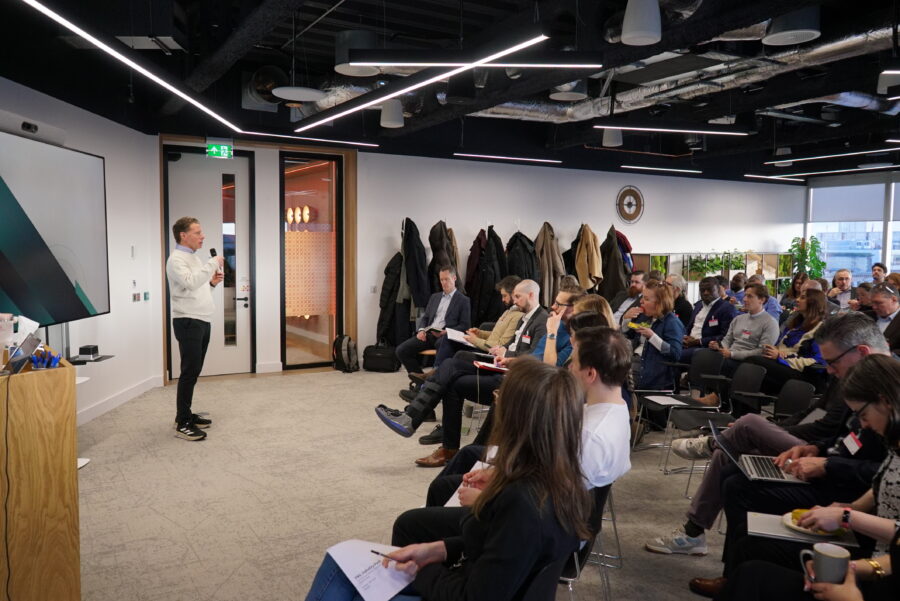
The event was the final showcase day of an Innovation Call – a pioneering initiative led by the Financial Regulation Innovation Lab (FRIL) at the heart of FinTech Scotland.
But, what is an Innovation Call, what happens on showcase day and what is achieved?
Well, join us as we take you behind the scenes of the day and speak to some of the people involved.
Let’s start with Clare Reid, Strategic Innovation Director at FRIL.
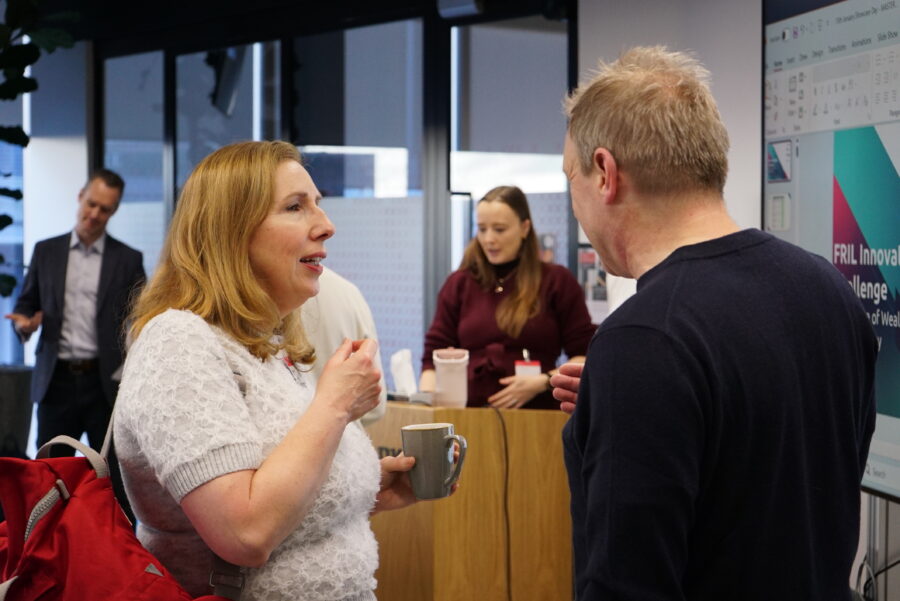
Clare, explain to us what to expect on a Showcase Day of an Innovation Call?
“Nerves certainly run high on showcase day of an Innovation Call! It’s the culmination of months of work for Fintech entrepreneurs as they pitch their solutions to an audience of potential Financial Services partners. And the stakes are high – there is an award of £50,000 to successful fintechs and the opportunity to take forward some potential game changing solutions and partnerships with those partners.“
What was the challenge or opportunity today’s call addressed?
“This call focused on the FCA’s Advice Guidance Boundary Review – which is addressing a very human issue about how to make financial help clearer, fairer and available to far more people.”
“The call is all about finding new ways to help consumers make informed financial decisions, delivering more accessible and tailored support while staying within evolving regulatory expectations.”
Who was involved?
“The call brings together fintech entrepreneurs, financials services and academia, who are all tackling some of the biggest challenges in financial services today.”
Let’s hear from one of the Fintech founders pitching today to hear their side of the story. Dia Banerji, founder of Cherpa.ai:
Dia, you’ve just done your pitch – how did it go?
“I was first up, which always adds a bit of pressure, but it felt good. The presentation went well. Most importantly, I was able to clearly tell the story of why Cherpa.ai exists.”
What was your pitch addressing?
“Cherpa.ai is an AI money coach that delivers hyper-personalised financial education. The pitch focused on the huge gap before financial advice – helping people build awareness, understanding, and confidence about their money, so they’re better prepared to make decisions.”
What are your hopes for the result?
“I’m really excited to be part of this cohort and would love to work more closely with some of the sponsors. Beyond that, it’s about being part of a wider fintech community, learning from others, and helping Scotland, and ultimately people everywhere, build more confidence and connection with their money”
And on that note, let’s hear from Kate Murray who works for Scottish Widows as part of Lloyds Banking Group.

What has struck you about the pitches that you’ve heard today?
“What’s really struck me is the breadth of innovation on show – from fintechs tackling very niche, complex problems to those covering the entire end-to-end customer journey. It’s impressive what they’ve delivered in such a short time, and the quality of the user interfaces has really stood out to me. They’re slick, well thought-through, and genuinely exciting to imagine working with as we design our future journeys.”
What does AGBR mean for your firm, and why does this call matter?
“For us, AGBR is about helping more people secure their financial futures, in a way that aligns with our wider purpose of helping Britain prosper. There’s a real advice gap in the industry, and a big void in the middle where people don’t know what to do next — how to save, how to prepare for retirement, or how to make better decisions. We see innovation and new solutions as a way to bridge that gap, giving people the clarity and confidence to take the next step towards a more prosperous financial future.”
“The Innovation Call matters because we’re always reviewing how we change, innovate, and go faster. And sometimes, being part of a big organisation slows us down. Bringing in outside thinking, new technology, and completely different perspectives helps us bridge that and move quicker.”
And let’s finish with Christine Sinclair, Programme Director for FRIL at the University of Strathclyde.

Christine, that was quite a day…anything else that might surprise us about an Innovation Call?
“It doesn’t stop here. There are many layers to an Innovation Call. While the successful fintechs will go on to partner with a financial services firm and grow their businesses, the research by the academics involved in the call is captured in White Papers to support industry learning.“
“The insights also shape current and developing skills programmes hosted by the University of Strathclyde and the University of Glasgow. These are aimed at helping people develop the skills they need to adopt new technologies responsibly, whether that’s AI, data, digital transformation or ESG reporting.”
Sounds interesting? You can hear more about those courses in this interview with Christine.
So what next for the fintechs who took part?
Now, the wait begins! Next week the judges will decide which teams will be awarded grants of up to £50,000 to develop, scale and implement their ideas.
But the journey doesn’t end there. Beyond the winners, many of these ideas are likely to spark further interest, partnerships and pilots in the months ahead.
We’ll keep you posted.
In the meantime, if you’d like to find out more about the work of the Financial Regulation Innovation Lab, please contact us at FRIL@fintechscotland.com.
Financial Regulation Innovation Lab (FRIL) Responsible Innovation Case Study: Ask Silver
FRIL: Stopping Scams Before The Payment Goes Through
At FRIL, practical innovation protects people. The Optimising Consumer Outcomes Innovation Call brought together fintechs, regulators, academics and banks to tackle real issues that affect millions of people across the UK.
Ask Silver, co‑founded and led by Alex Somervell, uses AI to stop scams before people lose money. The team’s passion, sparked by personal experience of financial harm, lies in protecting people from financial and emotional harm caused by scammers. Winning one of five funded FRIL innovation awards helped Ask Silver to hire earlier, accelerate product development and launch the Metro Bank Scam Checker sooner – delivering protection to customers sooner than planned.
“Engaging with FRIL gave us access to industry leaders from NatWest to Barclays to Tesco Bank. That insight into their challenges meant we could tailor what we built and get feedback as we built, rather than in isolation.” — says Alex, Co-founder & CEO, Ask Silver.
The Challenge : Protecting People from Scams
Scams and fraud are a growing national problem that harm people’s finances, confidence and wellbeing.
Fraud and scams are among the fastest-growing threats in financial services. In the UK alone, consumers lost £12.4 billion last year, 41% of over 50s in the UK have been scammed in the last five years and fraud accounts for over 40% of all crime.
The FCA’s Consumer Duty raises the standard for firms to protect customers, prevent foreseeable harm and deliver fair value. Many firms find meeting these expectations difficult because of legacy systems and manual processes. Stopping scams quickly – ideally before a payment is made – is a clear, measurable way to protect customers and meet regulatory standards across the UK.
For consumers this means clearer information, fairer treatment and stronger protection so
fewer people lose life savings or suffer emotional harm.
| For Industry | For Consumers |
|---|---|
| Consumer Duty isn’t just regulation, it’s about putting people first. It ensures financial firms act in customers’ best interests, helping prevent harm, exploitation, and financial crime before it happens and ensuring every interaction leads to fair, positive outcomes. | It means being treated with fairness and respect – with products they can trust, clearer information, and stronger safeguards against financial harm or scams. |
FRIL’s Formula for Change
FRIL’s Optimising Consumer Duty Innovation Call set seven practical challenges about improving consumer outcomes using technology and data. By pairing early‑stage fintechs with banks, regulators and academics, FRIL created a fast feedback loop for testing real solutions. Funding support plus direct access to decision‑makers allowed innovators to iterate quickly and scale solutions that benefit us all.
FRIL’s approach shows what’s possible when innovation and regulation work hand in hand. It proves that technology can help financial services not only do better, but be better: fairer, smarter, and more inclusive.
The Case Study :Ask Silver
Ask Silver gives people a fast, easy way to check messages, emails or links for scams. Users send content and receive an instant, human‑centred judgement and guidance so they can decide what to do next.
Ask Silver’s foundation is deeply personal to its founder:
“My dad was scammed, he lost almost £150,000 – most of his life savings. He was vulnerable for a number of reasons. Then three friends in their early 30s, all in tech, were scammed too, losing tens of thousands each. It shows that scams are a problem that affect everyone.” — Alex, Co-founder & CEO, Ask Silver.

Ask Silver’s core product is a scam-checker AI. A user sends a message, email, or website link. The system analyses it and responds with guidance. Ask Silver is delivering real impact so far in stopping scams before payments are made:
- Over 20,000 scam submissions analysed.
- Incidents reported to the National Cyber Security Centre and authorities.
- Many users avoided financial loss and learned how to spot scams.
- Broad media coverage that raised national awareness across BBC, ITV, Telegraph and
- Daily Mail
“Lots of people use it when they’re unsure. They do a quick check with us, get that instant second opinion, and it often leads them to do further research themselves to validate what we’ve said.” — explains Alex.
Ask Silver is live on WhatsApp and planning a roll‑out to web, app and video analysis so more people across the UK can access help in the way they prefer.
Ask Silver stats
| Sector | FinTech/Fraud Prevention |
| Employees | 6 |
| Location | London |
Impact of FRIL: Delivering safer digital finance
FRIL enabled Ask Silver to turn early support and industry links into national impact.
“We won £50,000. That was huge for us at the time as we’d only invested about £100,000 to get this far. That funding allowed us to hire two developers earlier, pushing development forward months sooner than we otherwise could have.” — says Alex.
How FRIL support translated into impact for the UK:
- How FRIL support translated into impact for the UK:
- 2 x developers hired ahead of schedule
- Building tools ahead of schedule (e.g. a Facebook Marketplace scanner)
- Expediting security and feature development
- Gaining validation that supported subsequent fundraising
- Being able to get Ask Silver out there to support more customers, more quickly
“We moved quicker than we would have otherwise. We built features earlier, hired earlier, and engaged with people in banks who we’d have struggled to meet.” — explains Alex.
For industry partners this meant that they could also pro-actively help customers:
“The goal is to ultimately stop scams. We want to be the most consumer- and human-focused anti-scam, anti-fraud product and company available on WhatsApp, web, and app, analysing not just text but video.” — adds Alex.
With FRIL’s connections and credibility, Ask Silver moved faster and gained proof points that helped scale their approach, making protection available to more people across the UK.
“If FRIL hadn’t been there, we’d have delayed hiring, faced less investment and taken longer to get that additional proof point and validation.” — says Alex
Outcomes – Turning Ambition into Action
As a result of the few months of collaboration with FRIL, Ask Silver achieved significant milestones.
- £50,000 FRIL grant secured
- New partnerships formed with major banking institutions
- 2 developer hires accelerated
- Product development accelerated, bringing protection to more people sooner
Case study conclusion
Practical regulation plus focused innovation protects people across the UK. Ask Silver shows how a small, human‑centred AI product can have a national reach: preventing financial loss, educating the public and supporting banks to meet higher consumer protection standards. When regulators, industry and innovators collaborate, technology becomes technology is not just a tool, but a source of safety – and a force for good.
Download the Ask Silver case study.
Cloud for financial services: An Industry Report on the Opportunities and Challenges
By Pinsent Masons & the Financial Regulation Innovation Lab (FRIL)
A decade ago, the “cloud in financial services” conversation was framed by caution, with the sector focused on navigating a series of hurdles to adoption. Today, the cloud is no longer a novel proposition cautiously assessed, but rather an indispensable component of the operational fabric and strategic future of financial services. The hurdles have, in many respects, become pathways, enabling unprecedented speed and innovation.
This report by Pinsent Masons, published in partnership with the Financial Regulation Innovation Lab (FRIL), revisits the cloud journey for financial services with a focus on the nuanced and complex reality facing financial institutions. Drawing on a series of candid “Chatham House” interviews with senior leaders across major financial institutions, technology providers and advisory firms, it explores the current dynamics of the market. The report is also supported by survey data sourced from more than 30 businesses operating within the financial services sector.
The interviews and the data reveal that the old hurdles have not disappeared, and some, like data residency, persist as challenges despite the context evolving. The primary drivers for moving to the cloud are now strategic – (1) the continuing need to escape the drag of legacy systems, (2) demand for pace and agility in segments being reshaped by AI, and (3) the realisation that the cloud can be a powerful tool for enhancing, rather than diminishing, operational resilience.
New and complex challenges have also surfaced. The initial promise of cost savings has proved elusive for some; governance and the maturity of shared responsibility models have struggled to keep pace with adoption; and regulators are focused on what they see as a continuing key concern – concentration of risk among a handful of hyperscale providers. As the sector stands on the cusp of an AI-powered technological wave – a wave that is dependent on the cloud – the lessons from the past decade are more critical than ever.

